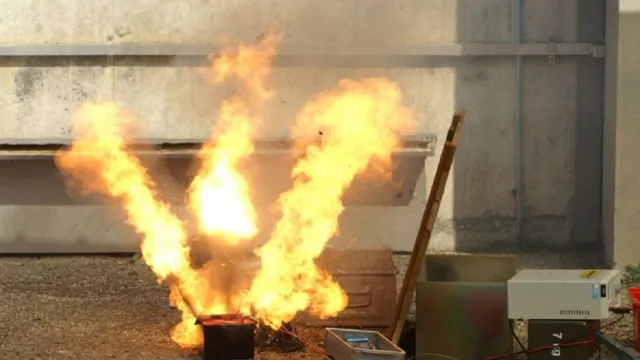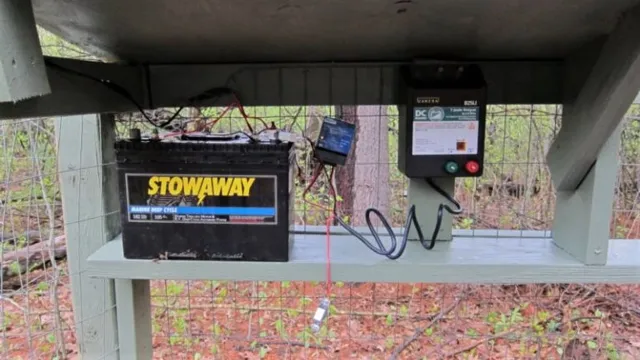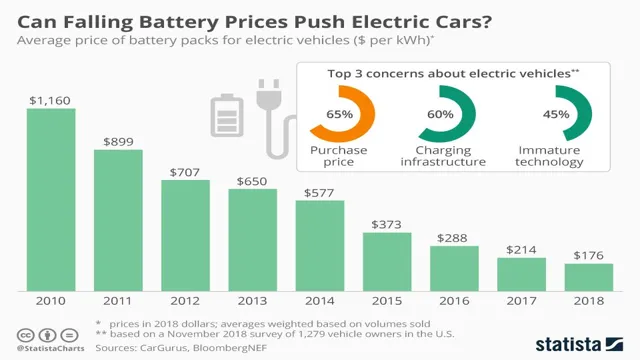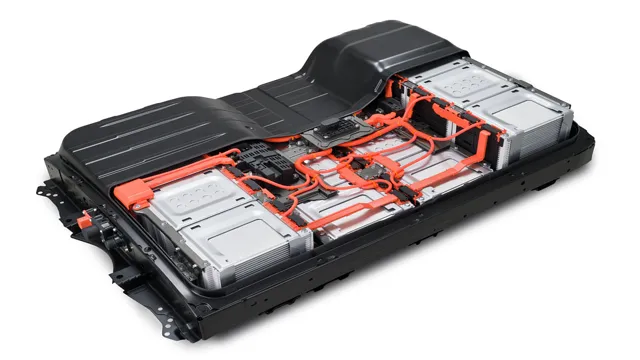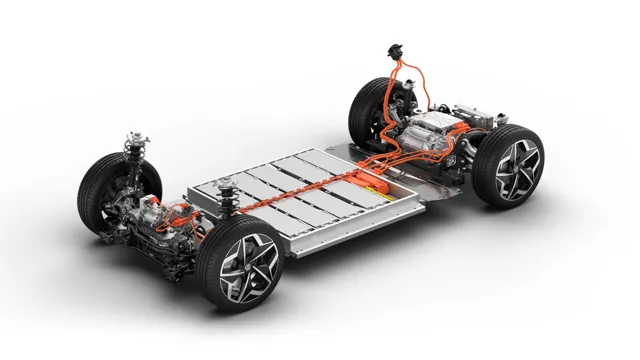Riding the Shockwaves: Debunking the Myth of Electric Car Battery Fires
Electric cars are becoming increasingly popular due to their eco-friendly nature and low operating costs. But with the rising demand for electric vehicles, there is also a growing concern about the safety of their batteries. One of the biggest risks associated with electric car batteries is the potential for fire.
This is because the batteries are made up of lithium-ion cells that are highly flammable if damaged or overheated. While the chances of an electric car catching fire are still relatively rare, it is essential to understand the cause and effect of this risk to ensure overall safety. In this blog post, we will be delving into the topic of electric car batteries and fire risk.
We’ll explore the causes of electric car fires, their outcomes, and how these risks can be mitigated to ensure safe and effective use of your electric vehicle.
Electric Cars and Fire Risk
With the growing popularity of electric cars, one common question many people have is whether or not electric car batteries have a higher risk of catching fire than traditional gasoline-powered cars. The truth is that while electric car battery fires can occur, they are actually quite rare. This is because these batteries are built with several safety features to prevent overheating and other potential hazards.
However, it is still important for electric car owners to take precautions and be aware of the potential risks. This includes properly maintaining the battery and avoiding situations that could cause damage or overheating. Overall, the risk of an electric car battery catching fire is low, and the benefits of driving an environmentally friendly vehicle far outweigh any potential safety concerns.
Explaining the basics of EV batteries and fire risk potential
Electric car batteries are an essential component of the vehicle’s power system. The batteries operate as the energy storage unit, providing the electric motor with power to move the car. However, since the batteries contain a large amount of energy, there is a potential fire risk associated with them.
The volatile nature of the lithium-ion batteries can cause them to overheat, leading to explosions or fires. To mitigate this risk, manufacturers have designed EVs with numerous safety mechanisms, such as thermal management systems and obstruction protection, that help to regulate the temperature of the batteries. In addition, many car models come with fire suppression systems that can quickly extinguish any fire before it escalates.
It is worth noting that the risk of an electric vehicle catching fire is much lower than that of a gasoline powered car. Nevertheless, it’s crucial to follow the manufacturer’s instructions and adhere to basic safety protocols when handling an EV battery.
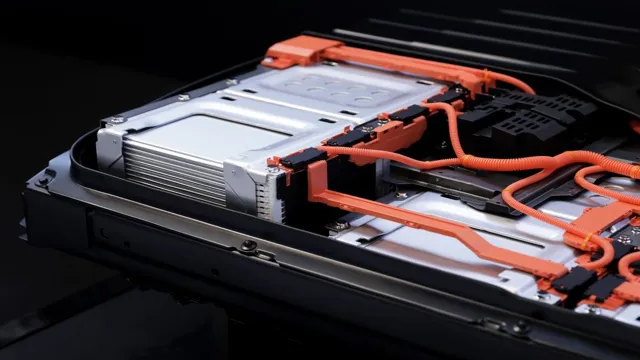
What statistics say about fire in electric cars
Electric cars have been touted as a safer and more environmentally friendly alternative to traditional vehicles. However, concerns about the safety of electric cars have arisen due to the risk of fire. According to statistics, the risk of fire in electric cars is lower compared to traditional gasoline-powered cars.
Studies have shown that electric car batteries are well-protected from fire, thanks to systems that monitor the battery’s temperature, power flow, and chemical emissions. Additionally, fire incidents in electric cars are rare, with only a handful of cases reported globally. With the continued advancements in electric car technology, the safety measures are increasing, like new cooling systems included in electric vehicles to mitigate potential fires.
Overall, it’s safe to say that electric cars’ fire risk is quite minimal, and the vehicles have been designed with various safety features to prevent fires from happening.
Causes of Fire in Electric Cars
“Do electric car batteries catch fire?” is a frequently asked question, and the answer is yes, in rare cases. However, it is important to note that the risk of an electric car battery catching fire is much lower compared to traditional gasoline-powered cars. One of the main causes of fire in electric cars is the battery overheating, which can occur due to various factors such as a manufacturing defect, damage to the battery, or overcharging.
In addition, accidents and collisions can also cause the battery to ignite. Fortunately, most electric cars are equipped with safety features that help prevent thermal runaways and fires. These safety measures include a battery management system that monitors and regulates the battery’s temperature and charge, as well as protective barriers that prevent damage to the battery in the event of an accident.
Overall, the risk of electric vehicle battery fires is rare, and electric cars are generally considered safe and reliable vehicles.
Battery defects that can lead to fire
As electric cars become more popular, there have been concerns about the safety of their batteries. While they are generally considered to be quite safe, there are a few potential battery defects that can cause fires. One of the most common causes of fire in electric cars is a short circuit in the battery.
This can be caused by damage to the battery’s casing, or by a manufacturing defect that causes the battery cells to overheat and melt. Another cause of fire is a phenomenon known as thermal runaway, which occurs when a battery cell overheats and causes neighboring cells to also overheat and fail. This can lead to a chain reaction that can quickly escalate into a fire.
While these defects are rare, it’s important for electric car owners to be aware of them and to take proper precautions to prevent them from occurring. Simple steps like avoiding extreme temperatures and keeping the battery properly charged can go a long way toward ensuring that your electric car remains safe and reliable.
Other causes of fire in electric cars
Besides battery-related issues, there are other causes of fire in electric cars that people should be aware of. One possible culprit is faulty wiring or connections in the car’s electrical system. Overheating components due to increased demand and electrical shorts can trigger a fire.
Another potential cause is problems with the cooling system of the electric motor, which can overheat and lead to a fire. Faulty charging equipment or incorrect charging procedures could also lead to a fire. It’s essential to use the manufacturer’s recommended charging equipment and follow the charging guidelines to avoid any potential issues.
Additionally, accidents involving electric cars can result in fires as well. But it’s important to remember that such accidents are relatively rare, and electric vehicles have been shown to be safe overall.
Preventing electric car battery fires
Electric car battery fires have been a topic of concern for some time now. While electric cars are generally safer than their gasoline counterparts, they pose unique challenges due to their lithium-ion batteries. These batteries have been known to catch fire due to a number of reasons, including improper installation, manufacturing defects, and physical damage.
In some cases, the batteries have also caught fire during charging or due to a short circuit. To prevent these fires, it is essential to ensure that the batteries are installed properly and are regularly inspected for any signs of damage or wear and tear. In addition, it is crucial to follow all manufacturer recommendations for charging the batteries correctly and safely.
By taking these steps, it is possible to minimize the risk of electric car battery fires and keep everyone safe on the roads.
Safety Measures and Best Practices
One of the major concerns that people have when considering electric cars is whether the batteries are prone to fires. The short answer is that these incidents are rare, but they can happen. The lithium-ion batteries that power electric cars are generally very safe, but they do contain a large amount of energy.
This means that if they are damaged in some way, such as in a severe crash, then there is a chance that they could catch fire. However, automakers have implemented a number of safety features to prevent this from happening. For example, the batteries are designed to shut down automatically if they detect a problem.
Additionally, the battery housing is made from fire-resistant materials, and there are cooling systems in place to prevent overheating. It’s important to remember that no vehicle is completely without risk, but electric cars are generally just as safe as traditional vehicles when it comes to fire risk.
How EV manufacturers ensure safety
When it comes to electric vehicles (EVs), safety is a top priority for manufacturers. To ensure the safety of drivers and passengers, EV manufacturers have implemented numerous features and best practices. One of the most important safety measures is the use of high-quality batteries that have been designed to withstand extreme temperatures and crashes.
These batteries are also protected by specialized systems that prevent overcharging and short circuits. Additionally, EVs are equipped with advanced driver-assistance systems (ADAS) that help drivers stay alert and respond to potential hazards on the road. These features include automatic emergency braking, lane departure warning, and blind spot detection.
EV manufacturers also prioritize safety with rigorous testing and certification processes to ensure that their vehicles meet industry standards and regulations. With all these measures in place, drivers can feel confident in the safety of their electric vehicles.
What drivers can do to prevent battery fires
When it comes to preventing battery fires in electric vehicles, there are a few safety measures and best practices that drivers can follow. First and foremost, it’s important to regularly inspect your EV’s battery and charging system to ensure everything is in good working order. This includes checking for any signs of damage, like cracks or leaks, and making sure all connections are secure.
Additionally, it’s recommended that you only use charging equipment that has been specifically designed for your vehicle’s make and model. When charging, it’s important to never leave your EV unattended for long periods of time and to avoid charging overnight or in extreme temperatures. If you do need to charge in these conditions, make sure to monitor the battery closely and stop charging if you notice any unusual behavior.
Finally, it’s important to follow all the manufacturer’s guidelines and recommendations for charging and maintaining your EV’s battery to avoid any potential issues down the road. Overall, by following these best practices and taking a proactive approach to EV battery safety, you can help prevent battery fires and keep your vehicle running smoothly for years to come.
Conclusion
In conclusion, while it is true that electric car batteries have been known to catch fire, the likelihood of this occurring is relatively rare and can often be attributed to external factors such as improper maintenance or damage to the battery. Just like any other form of transportation, it is important for electric car owners to take the necessary precautions and follow recommended safety guidelines to prevent accidents and ensure the longevity of their vehicle. So, while the occasional fiery headline may grab our attention, let’s not forget that electric cars remain a safe and sustainable option for the future of transportation.
“
FAQs
Can electric car batteries catch fire?
Yes, electric car batteries can catch fire due to various reasons such as manufacturing defects, damage to battery cells, or external factors like accidents or extreme temperatures.
How often do electric car batteries catch fire?
Electric car battery fires are rare occurrences, and statistically, the number of electric car fire incidents is much lower than the number of gasoline car fires.
What safety measures are taken to prevent electric car battery fires?
Electric car manufacturers follow strict safety protocols and guidelines to prevent battery fires, such as designing battery packs with fire retardant materials and implementing thermal management systems.
What should I do in case of an electric car battery fire?
In case of an electric car battery fire, evacuate the vehicle immediately and call emergency services. Avoid opening the hood or attempting to put out the fire yourself, as it can be hazardous.
